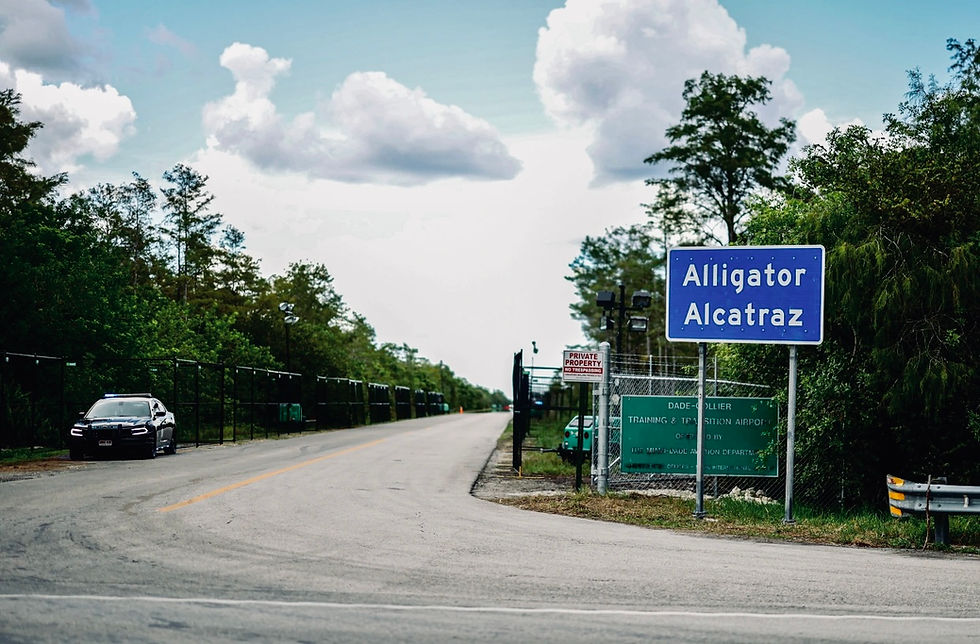Federal Judge Deals Blow to “Alligator Alcatraz”: Florida Ordered to Wind Down Controversial Detention Site
- Danika Joy Fornear

- Aug 21, 2025
- 3 min read

On Thursday, August 21, 2025, a federal judge delivered a stunning rebuke to both the Trump administration and Florida Governor Ron DeSantis, ordering an end to the expansion of the immigration detention site infamously dubbed “Alligator Alcatraz.”
U.S. District Judge Kathleen Williams issued an injunction that blocks the state and federal governments from bringing any new detainees to the facility, which has been the focus of escalating protests and lawsuits. The ruling also bans further construction, including the addition of tents, dormitories, lighting, or paved structures that would extend the airstrip-turned-prison deeper into the Everglades.
“This is a decisive step toward dismantling an illegal and inhumane facility that never should have existed in the first place,” said one organizer outside the courthouse, echoing the relief of immigrant rights groups who have fought the project since its inception.
A Blow to Expansion Plans
The order comes after months of mounting controversy over the secretive construction and environmental damage at the site, which was hastily built on a remote airstrip in South Florida. Civil liberties organizations have long argued that the detention center’s isolated location makes it nearly impossible for detainees to access attorneys, families, or public oversight.
Judge Williams’s ruling doesn’t shut the gates overnight, but it effectively pulls the plug on any future growth. Her 82-page opinion prohibits the addition of infrastructure and requires the state to begin dismantling what has already been erected — from industrial generators to sewage lines and fencing.
Within 60 days, the state must start stripping the site of its detention apparatus, a move that would render it uninhabitable. Williams noted that “attrition” — the gradual transfer of detainees to other facilities — should make the transition safer and more orderly.
What the Order Means for Detainees
While the ruling does not demand the immediate release or relocation of current detainees, it sets a firm deadline for winding down operations. Immigration attorneys say this window is critical: detainees can now be tracked and transferred rather than simply abandoned in the bureaucratic shuffle.
Advocates stress that the fight is far from over. “This is a victory for now,” one lawyer told Big Mouth Media, “but the government has a long history of simply moving people from one black site to another. The real battle is ensuring that these families are not just shuffled into another hidden warehouse.”
Environmental and Human Costs
“Alligator Alcatraz” has been under fire not only for its treatment of detainees but also for its ecological damage. The facility sits on the edge of the fragile Everglades ecosystem, where the installation of generators, high-powered lights, and waste systems disrupted wildlife and polluted surrounding waters.
Williams’s order specifically calls for the removal of this infrastructure, citing both human rights and environmental concerns. Environmental groups welcomed the ruling as recognition that detention cannot come at the expense of endangered habitats.
A Turning Point in Florida’s Immigration Fight?
The ruling represents one of the most significant legal challenges yet to the DeSantis-Trump strategy of militarizing Florida’s immigration enforcement. For months, state and federal authorities doubled down on raids, roadblocks, and mass detentions — leaving communities of immigrant workers terrified and destabilized.
“Alligator Alcatraz” had become both a symbol and a tool of that crackdown, a place where working families were disappeared into legal limbo. Now, Judge Williams’s injunction throws that entire strategy into question.
For immigrant rights advocates, it’s a crack in the wall of impunity. For the administration, it’s a public embarrassment that underscores the lawlessness at the heart of Florida’s detention experiment.
What Comes Next
Florida officials are likely to appeal, but for now, the countdown is on. Sixty days to dismantle generators, strip fences, and roll back one of the most infamous detention experiments in recent memory.
The protests that surrounded “Alligator Alcatraz” have not subsided — if anything, activists are now pressing harder to ensure this shutdown is permanent. As one sign read outside the courthouse: “Close it. Don’t move it.”
The Everglades are breathing again. Families may soon see their loved ones transferred. And the state of Florida has just been told — in no uncertain terms — that the law applies even in the swamps.









Comments